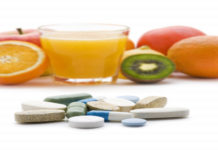A strong immune system is one of the key factors to lead a healthy life. And in order to have that resilient immune system which can fight the viruses, a proper diet is very essential. The right diet is critical to a strong immune system and nothing beats the natural way. The following are the building blocks you need to keep your defenses strong.
It’s best to get them from food. Supplements are usually not necessary unless you are taking therapeutic doses for a specific condition. However, if you don’t eat well in general or have a health problem you may want to discuss supplements with your doctor.
Proteins are central to the proper functioning of the immune system. The amino acids they provide are used to make antibodies and other immune compounds that attack foreign invaders and prevent infection. Almost all North Americans have more than enough protein in their diets.
Omega-3 and omega-6 fatty acids help in immune function. Omega-3 fatty acids, abundant in cold-water fish as well as in flaxseed, are especially beneficial in controlling inflammation and the harmful effects of rheumatoid arthritis and other autoimmune disorders. Research suggests that omega-3 oils help reduce acute inflammation, which occurs as part of the immune response to attack or injury. Omega-3s activate parts of the immune system that rein in attack cells to stop them when their job is done.
Vitamin E is a T cell enhancer. Vitamin E, found in oils, nuts and seeds, margarine and avocados, may enhance T cell activity and assist in the production of antibodies.
Vitamin C to fortify. Vitamin C, found in many fruits and vegetables, assists in building and maintaining mucous membranes and collagen,as well as strengthening the blood vessel walls, and is thought to enhance Bryce the function of the immune cells. Vitamin C supplements may help reduce the duration of a cold. Red peppers and kiwifruits are excellent sources of vitamin C.
Also Read: Immune System of Female Fetus May Prevent AIDS
Vitamin A is key. Found in liver, fish, milk, cheese, and eggs, vitamin A reduces the incidence and severity of infectious illnesses by helping to keep mucous membranes healthy and intact and also hikes antibody response and increases white blood cell proliferation. Beta carotene, once consumed, can be converted to vitamin A in the body.
Zinc is a trace mineral with many important functions, including supporting immunity. A deficiency of zinc has been associated with slow sound healing. The best food sources are foods of animal origin, including seafood (especially oysters), meat, poultry, and liver, as well as eggs, milk, leans nuts, and whole grains. But an excess of supplementary zinc can actually depress the immune system.
Selenium is a trace mineral essential for a strong immune system. The best sources of selenium are Brazil nuts, seafood, some meats and fish, as well as bread, wheat bran, wheat germ, oats, and brown rice.
Iron is an absolute must. Iron is required for the manufacture of B cells and T cells and ensure that cells get the oxygen they need to function properly and resist disease. Best sources are red meat, eggs, dried fruits, enriched grains, and cereals and legumes.
Antioxidants to protect against free radicals. Research suggests that antioxidant properties of carotenoids, such as lycopene (found in tomatoes and tomato products) and beta-carotene (found in orange, red, and yellow plant foods, as well as dark green vegetables) may protect immune cells from destructive free radicals, molecules that can harm cells and damage the DNA.
More immune boosters:
Garlic and onions may stimulate the fighting power of macrophages and T cells because of their powerful sulfur compounds, which may also block enzymes that allow organisms to invade healthy tissue. Some studies suggest that moderate exercise may help improve immune function, especially in people who were previously sedentary.
Some evidence indicates that shiitake mushrooms may boost immunity, but the practical significance of this is unknown.
Probiotics, friendly bacteria that can be found in some fermented milk products such as yogurt and kefir, may help improve immune responses against viruses.
Blueberries, blackberries, and grapes contain anthocyanins, powerful antioxidants that have potent immune stimulating properties.
Certain whey proteins, specially processed to provide a high dose of the amino acid cysteine, enhance immune function. Cysteine is used by the body in the synthesis of glutathione, one of the most important compounds of the immune system.
EGCG, a powerful antioxidant compound found in green tea, may have the ability to inhibit the growth of cancer cells as well as neutralizing harmful free radicals.
There are no “quick fix” diets for the immune system.
Some unscrupulous practitioners exploit the importance of the immune system and the difficulty of understanding its complexity by publicizing methods to boost “immune power.” These practitioners recommend a program: to cleanse the body, followed by megadoses of vitamins, minerals, and acids, to restore immune power. There is no evidence that such regimens immunity, and high-dose supplements can be dangerous.
So weigh your options carefully before you tread the path of building a strong immune system.
-end-




































